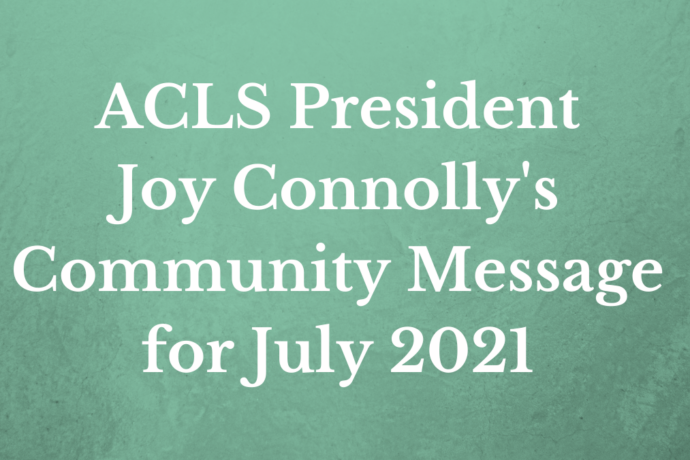ACLS Community Message for July 2021

It’s been a long year, and most scholars I know are trying to find the right balance of work: catching up on research long delayed, teaching summer classes, advising students, writing committee reports and tenure reviews, preparing syllabi for fall, organizing Annual Meetings, leading retreats, and other duties — along with taking some much-needed time to rest.
Work! Followers of ACLS will know that much of our own work involves convening scholars at every career stage from many different colleges and universities and in jobs beyond academia. In the course of administering programs like the Leading Edge Fellowship and in the Mellon-funded Intention Foundry and the Luce Design Workshop for a New Academy, we talk regularly with doctoral students, PhDs in various posts, contingent and tenure-line faculty, deans, university presidents and provosts.
Work is a standout theme in our convenings this year – specifically the mismatch between the work done by faculty and doctoral students and the reward systems in place at many of the colleges and universities that employ them. This mismatch is especially pressing right now as institutions seek not only to diversify student and faculty ranks but to create a sense of belonging for all and to foster scholarship in areas and topics too long ignored or under-served. This evolution will not happen on its own. It requires time, care, attention, and energy from the faculty, staff, and administration. Graduate students, who understand very well that this work will shape the world they will inhabit for decades, have much at stake and often play a key role in pushing it forward. This is important work, crucial work, and it demands recognition and reward.
What is this work? Breaking down and demystifying the “hidden curriculum” that creates barriers to first gen students, low-income students, and many students of color; tugging skeptical colleagues through a deep review of departmental courses or mentoring practices for graduate students; setting up first-book writing seminars that hone scholarly skills and build supportive community; designing new courses that experiment with alternative modes of knowledge creation and circulation; creating internship programs for undergraduates and doctoral students; revamping doctoral admissions requirements and curricula so that smart, passionate students can gain the skills they need to pursue advanced study, such as archival research or language proficiency; doing publicly engaged scholarship, with a view to keeping departments dynamic and alive. This work is the work of excellence.
One of the challenges facing this work (and my list represents a tiny selection of what is being undertaken) is its invisibility at crucial moments in the scholar’s career: hiring, promotion, merit review. This summer and fall, with the generous help of our interlocutors, we at ACLS are gathering the products of many years of thinking about how this work can become more visible and valued across academia, with a view to creating a useful resource we can share with the Intention Foundry, the Design Workshop, and you. We are grateful to the wise and inspiring people at (to name a few) Imagining America, Bringing Theory to Practice, the Whiting Foundation, the Community College Humanities Association, Project Pericles, and our member societies, as well as participants in initiatives on graduate education, public humanities, and equity projects funded by the NEH, The Andrew W. Mellon Foundation, the Association of American Universities, the Council of Graduate Schools, and other organizations, who have paved the way to doing justice to the work that sustains scholarly excellence.
We heartily thank all our supporters, who have taken our fiscal year to a strong finish: you make our work possible. We wish all of you a restful and rewarding summer.
Sign up for the monthly ACLS Community Newsletter, as well as announcements and updates about programs, events, and more.

